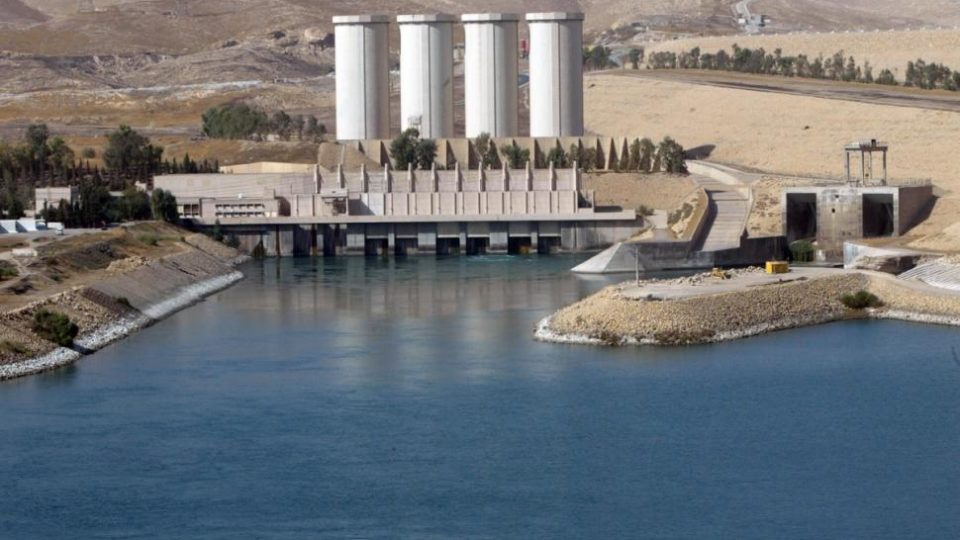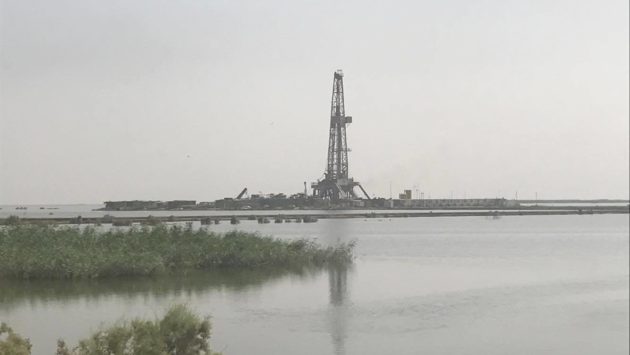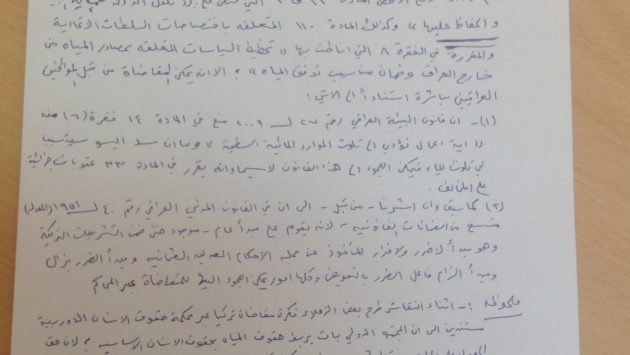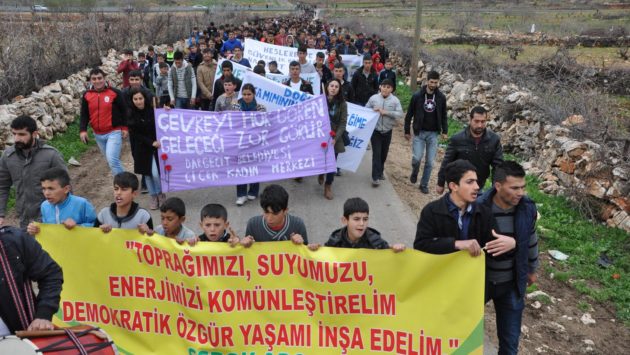Water: A Defining Issue for Post-2015 Iraq
By Toon Bijnens, ICSSI and Save the Tigris Campaign
Following the ICSSI Conference in Oslo (27-29 October 2014)
Recently, the following article by South-Asian based journalist Amantha Perera was published. It exposes how water will be a defining issue for the world for decades to come. The issue is especially relevant for Iraq today.
Water: A Defining Issue for Post-2015
By Amantha Perera
STOCKHOLM, Sep 23 2014 (IPS) – A gift of nature, or a valuable commodity? A human right, or a luxury for the privileged few? Will the agricultural sector or industrial sector be the main consumer of this precious resource? Whatever the answers to these and many more questions, one thing is clear: that water will be one of the defining issues of the coming decade. Some estimates say that 768 million people still have no access to fresh water. Other research puts the number higher, suggesting that up to 3.5 billion people are denied the right to an improved source of this basic necessity. As United Nations agencies and member states inch closer to agreeing on a new set of development targets to replace the soon-to-expire Millennium Development Goals (MDGs), the need to include water in post-2015 development planning is more urgent than ever.
The latest World Water Development Report (WWDR) suggests, “Global water demand (in terms of water withdrawals) is projected to increase by some 55 percent by 2050, mainly because of growing demands from manufacturing (400 percent), thermal electricity generation (140 percent) and domestic use (130 percent).” In addition, a steady rise in urbanisation is likely to result in a ‘planet of cities’ where 40 percent of the world’s population will reside in areas of severe water stress through 2050. Groundwater supplies are diminishing; some 20 percent of the world’s aquifers are facing over-exploitation, and degradation of wetlands is affecting the capacity of ecosystems to purify water supplies. WWDR findings also indicate that climbing global energy demand – slated to rise by one-third by 2030 – will further exhaust limited water sources; electricity demand alone is poised to shoot up by 70 percent by 2035, with China and India accounting for over 50 percent of that growth.
Against this backdrop, water experts around the world told IPS that management of this invaluable resource will occupy a prominent place among the yet-to-be finalised Sustainable Development Goals (SDGs), in the hopes of fending off crises provoked by severe shortages. “We are discussing the goals, and most member [states] agree that water needs better coordination and management,” Amina Mohammed, the United Nations secretary-general’s special advisor on post-2015 development planning told IPS on the sidelines of the annual Stockholm World Water Week earlier this month. What is needed now, Mohammed added, is greater clarity on goals that can be mutually agreed upon by member states.
Other water experts allege that in the past, water management has been excluded from high-level decision-making processes, despite it being an integral part of any development process. “In the next 30 years water usage will rise by 30 percent, water scarcity is going to increase; there are huge challenges ahead of us,” Torgny Holmgren, executive director of the Stockholm International Water Institute (SIWI), told IPS. He added that the way the world uses water is drastically changing. Traditionally agriculture has been the largest guzzler of fresh water, but in the near future the manufacturing sector is tipped to take over. “Over 25 percent of [the world’s] water use will be by the energy sector,” Holmgren said.
For many nations, especially in the developing world, the water-energy debate represents the classic catch-22: as more people move out of poverty and into the middle class with spending capacity, their energy demands increase, which in turn puts tremendous pressure on limited water supplies. The statistics of this demographic shift are astonishing, said Kandeh Yumkella, special representative of the secretary-general who heads Ban Ki-moon’s pet project, the Sustainable Energy for All (SE4ALL) initiative. Yumkella told IPS that by 2050, three billion persons will move out of poverty and 60 percent of the world’s population will be living in cities. “Everyone is demanding more of everything, more houses, more cars and more water. And we are talking of a world where temperatures are forecasted to rise by two to three degrees Celsius, maybe more,” he asserted.
Full article continued here on the website of IPS News Agency.
As the article makes clear, water is a global issue which is growing increasingly complex and urgent. Almost nowhere is the water situation more critical than in Iraq. Afterdecades of conflict, Iraq’s water resources have become severely limited.The current crisis has only escalated this problem, leading to intense competition among opposing groups over this most basic resource. More than a million Iraqis have been forced to flee their homes and are in dire need of food, sanitation, shelter and, perhaps most urgently, water.
Amidst the current instability, securing this vital resource for all civilians should be both a top priority for the new Iraqi government, and a predominant theme in all ongoing regional negotiations. Internal to Iraq, water supply networks have been attacked by all participants in the conflict in order to put pressure on their opponents. Water infrastructure, such as the Mosul and Haditha Dams, have become battle sites in recent months. Though no damage to Iraq’s most important dams has yet been reported, they have become unstable. This only makes the regulation of the water supply more tenuous and insecure, and threatens generating a grave humanitarian and environmental problems. Tensions over water extend outside Iraqi borders and impact the entire region. In particular, there is the construction of the Ilisu Dam which, though located in Turkey, will directly effect the flow of water to Iraq and Syria. The dam’s impact thus cuts across national boundaries and heightens insecurity in the entire region, triggering fear about water scarcity. If ignited, this fear could lead to a full-scale war between neighboring countries. Beyond political stability, Iraqi’s need their fundamental necessities secured — the foundation of which is access to water.
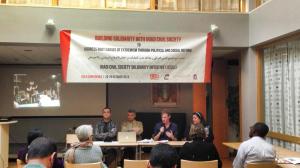
In Iraq, authorities have focused primarily on technical solutions, often in the form of big infrastructure projects, to deal with Iraq’s water problems. However, the current crisis in Iraq demonstrates how destructive dams can be. Any future water strategy will therefore have to be all-encompassing and involve all relevant actors in Iraq. It will have to draw on local communities and civilians, listening to the challenges they face, and prioritizing their particular needs. In addition, all policy must look outward, to the larger international community, and be in full cooperation with international bodies such as the UN.
Given this, we call upon the Iraqi government:
- to provide immediate humanitarian assistance to displaced persons within Iraq, especially with regards to water, food and sanitation.
- to establish a crisis and post-crisis water policy, which includes reforms to the public sector.
- to cooperate fully with international organizations such as the UN, to adhere to UN development goals.
- to plan the rehabilitation of water infrastructure.
With coordination and cooperation of all involved parties — including government officials, private companies, civil society groups, and academics — this problem can be addressed effectively. Together, we need to develop an extensive plan for the management of the current crisis, as well as a detailed and practical future strategy for Iraq’s water policy. If the country puts a long-term water strategy in place, water resources can be fairly distributed, environmental issues can be addressed and, with effort, Iraq may be able to meet the soon-to-be finalised Sustainable Development Goals (SDGs).

